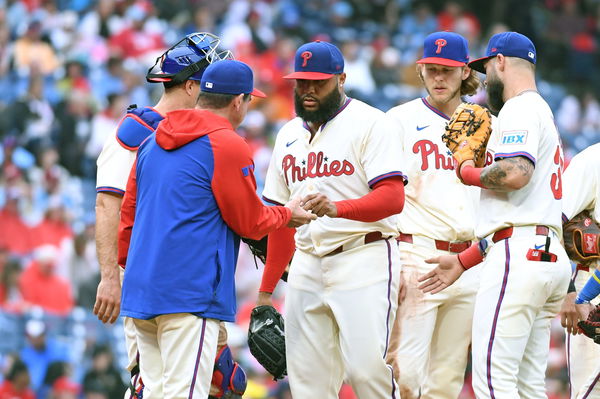
via Imago
Image: MLB.com

via Imago
Image: MLB.com
Baseball loves preaching tradition until there’s a shinier check on the table, and suddenly loyalty evaporates. The Philadelphia Phillies, once a comfortable fixture on NBC’s airwaves, are now pawns in MLB’s latest corporate courtship. Fans expecting familiar voices are instead funneled toward a new streaming altar, whether they like it or not. MLB calls it progress; Philadelphia calls it another bill dressed up as innovation.
You can hear the MLB and Rob Manfred shout at almost all times that they put fans first and care about the fans, but when they make moves like this, questions come up. The fans were happy with NBC showing the Phillies games, but the MLB had to go out and spoil it for them with an overpriced streaming platform. And nobody is happy about it.
In a recent Inquirer article, they talked about the Phillies games that won’t be aired on NBC and why this is a bad move. They wrote, “It’s Apple TV+ night for those who celebrate, forcing Phillies fans excited over Kyle Schwarber’s historic night to turn away from NBC Sports Philadelphia… you can use Apple’s best feature and change the audio to the radio feed from 94.1 WIP.”
ADVERTISEMENT
Article continues below this ad
Apple TV’s Friday Night Baseball broadcasts have quickly become infamous, but not for the right reasons. Fans blasted the commentary, mocking claims about J.T. Realmuto’s framing and ridiculing announcers as clueless outsiders. With Wayne Randazzo, Dontrelle Willis, and Heidi Watney on call, criticism outweighed any intended entertainment. For a platform spending millions annually, the broadcast quality feels like an embarrassing liability rather than a celebrated highlight.

via Imago
Image: MLB.com
Ironically, the most praised Apple TV feature isn’t video, but the ability to swap in radio. Frustrated fans repeatedly emphasized preferring local radio voices over Apple’s commentary, underscoring glaring disconnects in presentation. This feature effectively masks commentary flaws, but it also reveals the platform’s growing identity crisis. If fans are bypassing your announcers, the broadcast itself stops serving its supposed central value.
That disconnect becomes more glaring with Apple TV+ increasing subscription prices while still losing over $1 billion. MLB, which constantly brands itself as “fan first,” risks alienating loyal audiences by prioritizing profit over accessibility. Locking games behind a pricier, criticized service contradicts baseball’s supposed commitment to reach broader, passionate communities. In the end, what MLB sells as modernization increasingly feels like expensive gatekeeping disguised as innovation.
And that’s the hook — fans were never asking for glossier graphics, just genuine access and connection. Yet MLB and Rob Manfred keep handing Philadelphia Apple TV bills instead of NBC familiarity, then calling it “progress.” The Phillies faithful aren’t fooled; they know a cash grab when they see one. Until MLB learns that loyalty can’t be streamed, this experiment will remain baseball’s most expensive punchline.
ADVERTISEMENT
Article continues below this ad
Broadcasting might not be the only thing Rob Manfred and MLB are ruining
MLB has a remarkable talent for turning its crown jewels into costume jewelry, and Rob Manfred is polishing away again. After streaming deals already left Phillies fans grumbling, the commissioner now has his eyes on the Home Run Derby. What should be baseball’s most joyous spectacle risks becoming another overproduced experiment. If Manfred can sap fun from broadcasting, imagine what he can do to the Derby.
ESPN’s sudden retreat from its long-standing deal has left the Home Run Derby exposed, dangling as a prize for hungry bidders. Apple, FOX, NBC, and even Netflix are circling, each sensing opportunity in the void. Among them, Netflix stands out, eager to bolster its fragile sports credentials with something splashy. Live baseball would give Sarandos and company exactly the credibility they’ve been chasing in their streaming expansion.
Top Stories
Netflix’s motivations are hardly mysterious, as live sports represent the most reliable subscriber magnet left untapped. The company’s track record is checkered, with spectacles like Jake Paul versus Mike Tyson drawing mixed reactions. Still, the Home Run Derby offers viral promise, a cultural event bigger than its baseball context. For Netflix, exclusivity transforms it into a jewel, but for fans, it becomes a barrier.
ADVERTISEMENT
Article continues below this ad
That barrier could strangle one of baseball’s rare crossover events, shrinking its reach and cultural relevance. MLB already struggles to capture younger audiences, yet Manfred’s strategy favors short-term profits over sustainable exposure. Shipping the Derby to Netflix would make accessibility worse, frustrating loyalists while alienating potential newcomers. What Netflix sees as growth, many fear, could mark the beginning of the Derby’s decline.
And that’s the rub—what Netflix frames as innovation, Rob Manfred treats as strategy. MLB doesn’t need another streaming experiment; it needs visibility, relevance, and fans who can actually watch. Yet Manfred seems determined to shrink the tent while pocketing the cover charge. If he manages to turn the Home Run Derby into another subscription headache, don’t be surprised when baseball’s “growth plan” looks more like a disappearing act.
ADVERTISEMENT
ADVERTISEMENT
ADVERTISEMENT
ADVERTISEMENT


